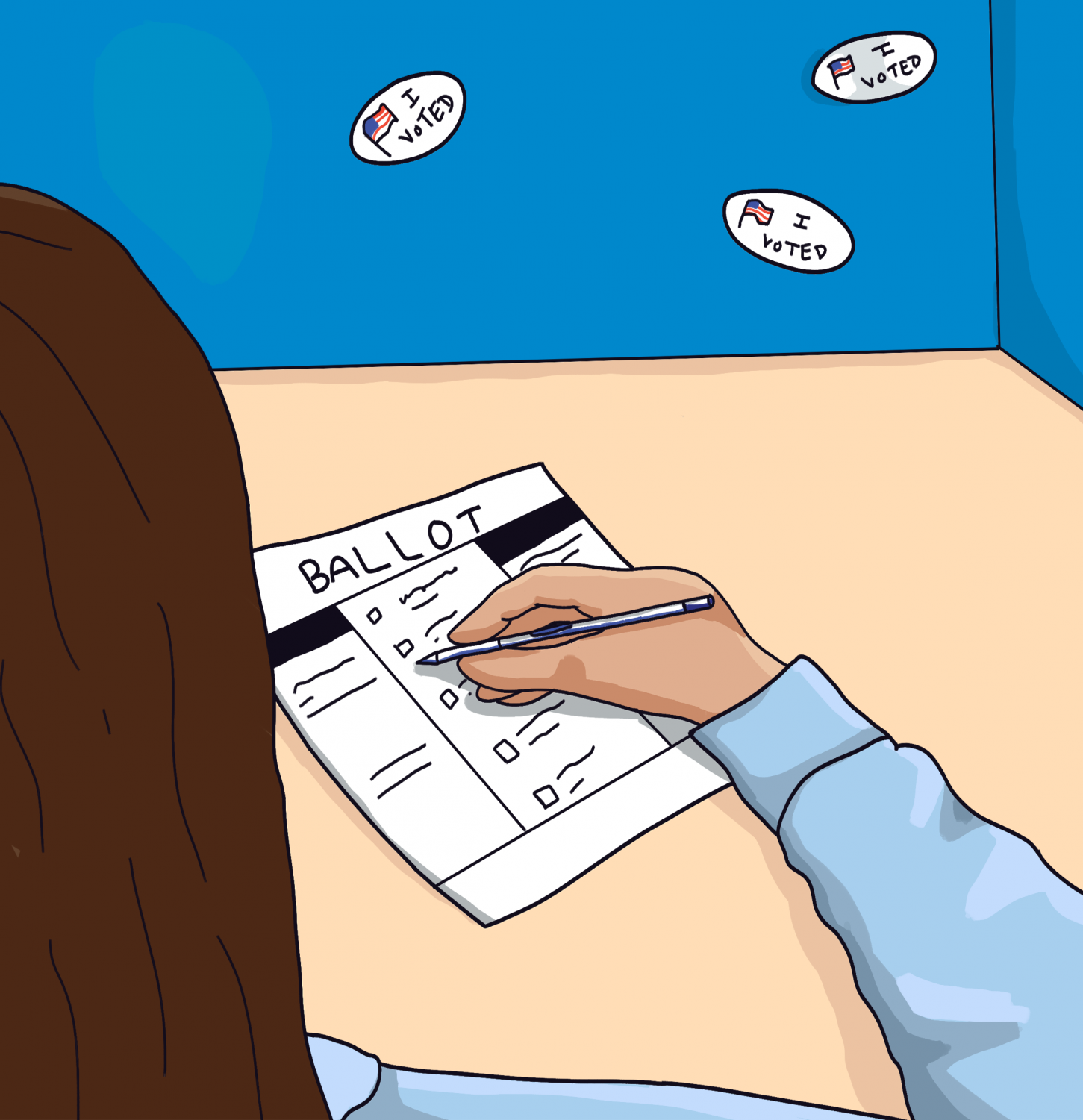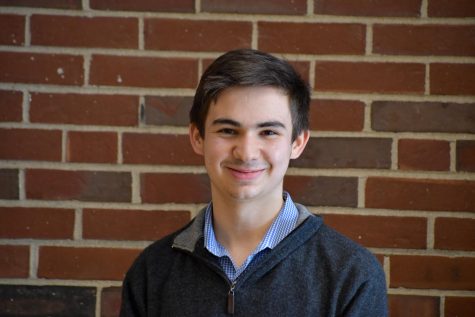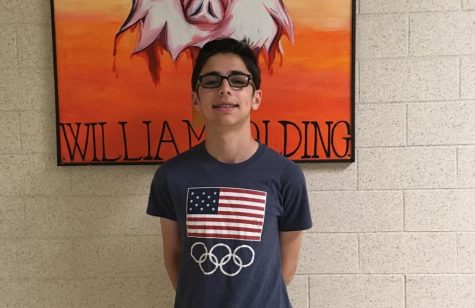A donation of $40 or more includes a subscription to the 2025-26 print issues of The Harbinger. We will mail a copy of our fall, winter, spring and graduation issues to the recipient of your choice. Your donation supports the student journalists of Algonquin Regional High School and allows our extracurricular publication to purchase equipment and cover our annual website hosting costs.
Algonquin elects Biden
Students vote to pass two MA ballot questions
October 30, 2020
The 2020 presidential election is believed by many to be one of the most heated political battles the United States has ever seen. President Donald Trump and former Vice President Joe Biden have been fighting to win the support of the nation for over a year. While much of the nation will be casting their ballots next week, many Algonquin students are not eligible to vote, but still hold political opinions.
Presidential Election
A Harbinger survey of 272 students, which was conducted via Google Forms, from Oct. 16 to Oct. 22, included questions about presidential preference and the Massachusetts ballot measures. The mock election resulted in overwhelming support for Democratic nominee Joe Biden, who received 80% of the votes, while Republican nominee Donald Trump received 13% of the votes. Seven percent of respondents voted for third-party candidates including Jo Jorgensen and Howie Hawkins.
“I’m supporting Joe Biden because I agree with a lot of his policies and I feel like he actually has a plan to deal with the COVID pandemic and address things like racial inequality and climate change,” senior Jarrod Caracciolo said in an interview via Zoom.
Of the 13% of respondents who indicated they prefer Trump, a sophomore was the only survey respondent willing to be interviewed but would only do so if they were unnamed, due to safety concerns.
This sophomore, along with 69% of Trump supporters who responded to the survey, feels they are at risk for bullying or harassment because of their political beliefs.
“I have been seeing my friends and people who share my political beliefs being targeted by groups like Antifa,” the sophomore said via Zoom. “It is the stereotype that if you vote for Trump, you’re racist or homophobic, which isn’t true… my friends from this area have [been harassed] and I have been too scared to officially say, I’m pro-Trump.”
“I am attracted to Trump’s policies based on how he is using less federal power for individual freedom,” the sophomore said.
Support among the Algonquin community for President Trump has decreased since 2016. According to a Harbinger survey of 353 students conducted via Google Forms in October 2016, Trump received 27% of the vote and Democratic nominee Hillary Clinton received 50%.
The anonymous sophomore believes this decrease is due to more “anti-Trump bias in the media.”
Typically, people vote based on which candidate’s policies they like, but this year, many people are voting for a certain candidate out of dislike for the other candidate.
Senior Nicholas Seto, along with 68% of the Biden supporters, is supporting Biden because he feels the alternative, Trump, is much worse.
“Joe Biden was definitely not my first choice in the Democratic primaries, but he’s also not the worst option,” Seto said in an interview via Zoom. “When it comes to governing, I think Joe Biden could do a better job than Donald Trump.”
Just 24% of those who voted for Biden did so because they “liked them as a candidate.” Sophomore Noah LaBelle falls into this category.
“[Biden] is the person who aligns the most with my core values,” LaBelle said in an interview via Zoom. “I think that him and his administration would bring about the most positive change in stark comparison to what the current administration has done.”
The Algonquin community supports Biden much more than the American populous. According to national polling data compiled by FiveThirtyEight on Oct. 29, Biden had the support of 52% of Americans.
Senior Andre Knapp voted for Libertarian nominee Jo Jorgenson because he feels it is important the U.S. moves away from a two-party system.
Knapp acknowledges it is nearly impossible for a third-party candidate to win the election but hopes this will be a step in the right direction.
“A lot of people aren’t satisfied with the two candidates that are running for president right now,” Knapp said in an interview via Zoom. “If you support a third party now you’re ensuring that in the future there can be another party.”
Ballot Measures
In addition to determining who will be the president, elections serve to pass many laws through ballot measures. This year, Massachusetts voters will be making a decision on two ballot measures.
Question 1 is an extension of the 2013 “Right to Repair Act.”
According to the Massachusetts Information for Voters guide, a YES vote on Question 1 would give smaller auto repair shops, as opposed to just car dealerships, access to telematics (a new form of mechanical data), allowing them to stay competitive with dealerships.
A NO vote on Question 1 would prevent consumer mechanical data from being used by auto repair shops, but also protect this data from potential privacy issues.
The results of the mock election showed overwhelming support for “Yes on Question 1.” Of the 249 students who voted on this measure, 85% were in favor of its implementation.
“I feel like if we want to maintain a free market, we need to allow smaller businesses to have that information about parts so they can better service vehicles and be competitive,” Caracciolo said.
Junior Alexandra Varner is against Question 1.
“I think you have a right to your information, so I think I’d vote no on 1,” Varner said in an interview via Zoom.
Question 2 proposes the introduction of ranked-choice voting (RCV) for all state elections. RCV is a system in which voters rank candidates in order of preference. If during the first round, a candidate has over 50% of the votes, they are the winner. If no clear winner emerges from the first round, then the candidate with the fewest votes will be eliminated, and anyone who voted for that person as their number one choice would then be voting for their number two choice. This process continues until one candidate has over 50% of the votes.
A YES vote on Question 2 would create a system of ranked-choice voting in Massachusetts.
A NO vote on Question 2 would make no changes to how elections are conducted.
Of the 260 students who voted on this measure, 66% were in favor of its implementation.
“[Ranked choice voting] is a great way to improve democracy,” senior Miranda Slingluff said. “I hope we will eventually get to a national ranked-choice voting system.”
Many political analysts worry RCV will make elections too complicated. In addition, analysts have found that voters are often under-informed about the candidates. According to Gordon Weil, a career politician, for RCV to work, voters would have to know about the policies of every candidate, not just the one they support.



